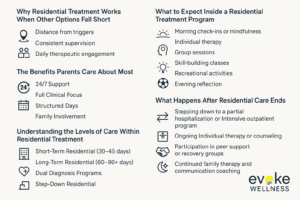When your child is in crisis, every choice feels urgent. You’re weighing options, trying to figure out what will actually help, and feeling the pressure to decide quickly. You may have heard about residential treatment before, but you’re wondering—does it work? Is it worth putting your child through something so structured and intense?
At Evoke Wellness Ohio, we’ve walked with countless parents through this same decision. A residential treatment program can be one of the most effective ways to stabilize your child, address both substance use and mental health, and give them the tools to build a different kind of future. But understanding how and why it works will help you make the right call with confidence.
Why Residential Treatment Works When Other Options Fall Short
Outpatient counseling and home-based support have value, but when a young adult’s safety, mental health, or substance use is spiraling, those approaches may not be enough. Residential treatment provides what most other levels of care can’t:
- Distance from triggers – A safe, contained environment away from friends, locations, or situations that encourage harmful behavior.
- Consistent supervision – Staff available around the clock to respond to crises, anxiety spikes, or impulsive urges.
- Daily therapeutic engagement – Multiple sessions each day that focus on skill-building, emotional regulation, and coping strategies.
This isn’t about locking someone away—it’s about creating a stable, distraction-free environment so deeper healing can begin.
The Benefits Parents Care About Most
Parents in crisis aren’t just looking for a “program.” They’re looking for outcomes that matter to their family’s reality. Some of the most valued benefits include:
24/7 Support
If your child has unpredictable moods, panic attacks, or sudden urges to leave treatment, trained professionals are on hand at any hour. You don’t have to be the emergency responder anymore.
Full Clinical Focus
While detox is centered on medical stabilization, residential treatment shifts to therapy and behavioral change. The focus is on the why behind the behavior—not just the symptoms.
Structured Days
For many young adults, substance use and mental health struggles create chaos in their daily routine. Residential care introduces consistency—healthy meals, regular sleep, therapy times—which supports brain and body healing.
Family Involvement
You’re not a bystander in this process. Family sessions and educational workshops help you understand your role in supporting recovery without enabling unhealthy patterns.
Holistic Support
In addition to therapy, many programs offer recreational activities, nutrition guidance, mindfulness, and other approaches that support whole-person health.
Understanding the Levels of Care Within Residential Treatment
Not all residential treatment programs are identical. Matching your child to the right level of care is key to success.
- Short-Term Residential (30–45 days) – Focused on stabilization, initial therapy, and planning for continued care.
- Long-Term Residential (60–90+ days) – Offers more time to address deeply rooted patterns, trauma, and co-occurring disorders.
- Dual Diagnosis Programs – Specifically designed for clients dealing with both mental health conditions and substance use.
- Step-Down Residential – Provides a bridge between intensive treatment and outpatient care, giving your child more independence with continued structure.
A qualified program will assess your child’s needs and recommend the right level rather than applying a one-size-fits-all approach.
How to Tell if Your Child is Ready for Residential
“Ready” doesn’t mean they’re asking for help—it means the situation calls for more intensive intervention than other settings can offer.
Signs your child may need residential care:
- Repeated relapses despite outpatient therapy or IOP.
- Self-harm, suicidal ideation, or severe mood swings.
- Unstable or unsafe living environment.
- Inability to manage school, work, or basic responsibilities.
- Escalating risk-taking or dangerous behavior.
Even if your child is resistant, a crisis often makes them more open to change than they realize. Acting quickly can prevent further harm.
What to Expect Inside a Residential Treatment Program
One of the fears parents often have is sending their child into the unknown. Knowing what a day might look like can ease that anxiety.
A typical schedule could include:
- Morning check-ins or mindfulness – Setting a calm tone for the day.
- Individual therapy – One-on-one time with a licensed therapist to address personal goals and challenges.
- Group sessions – Building connection and practicing social and emotional skills.
- Skill-building classes – Topics like coping strategies, relapse prevention, and emotional regulation.
- Recreational activities – Art, fitness, nature walks, or team activities to encourage healthy outlets.
- Evening reflection – Reviewing progress and planning for the next day.
This structured environment gives your child a safe rhythm and reduces the overwhelm that often comes in early recovery.
What Happens After Residential Care Ends
One of the most important predictors of success is the strength of the aftercare plan. The best programs will never send your child home without a clear next step. Aftercare may include:
- Stepping down to a partial hospitalization or intensive outpatient program.
- Ongoing individual therapy or counseling.
- Participation in peer support or recovery groups.
- Continued family therapy and communication coaching.
- Specific relapse prevention strategies tailored to your child’s triggers.
The transition out of residential care is just as critical as the time spent inside it. A strong bridge between treatment and real life makes it more likely your child will maintain progress.
Frequently Asked Questions About Residential Levels of Care
Q: How is residential treatment different from inpatient care?
Inpatient care is generally hospital-based and focuses on acute stabilization, often for psychiatric emergencies. Residential treatment provides ongoing therapy and life skills training in a less clinical, more home-like environment.
Q: Can my child be in a program that focuses on young adults?
Yes. Many facilities, including Evoke Wellness Ohio, offer age-specific tracks or groupings so peers are in similar life stages.
Q: Will my child have contact with us during treatment?
Most programs encourage family involvement after an initial orientation period, often through scheduled calls, visits, and family therapy sessions.
Q: What if my child wants to leave early?
While adults can legally leave, staff work hard to keep them engaged. If they do leave, they can often return when ready. Leaving early does not mean the door is closed.
Q: Does insurance cover residential care?
Many insurance plans cover part or all of residential treatment. Our admissions team can verify your benefits and explain any costs upfront.
Q: Is residential treatment only for substance use?
No. Many programs treat co-occurring mental health disorders, behavioral issues, and crisis stabilization, either alongside or separate from substance use treatment.
The Bottom Line for Parents in Crisis
Residential treatment works when it’s matched to your child’s needs, supported by skilled clinical care, and paired with a strong aftercare plan. It’s not just about getting them away from the problem—it’s about giving them the tools, stability, and support to face life differently when they leave.
If you’re in the middle of a crisis right now, you don’t have to decide blindly. Ask questions, get clear on the level of care, and choose a program that sees your child as a whole person, not just a diagnosis.
Call (866)430-9267 or visit our our services residential treatment program in Hilliard, Ohio. You don’t have to make this decision alone—our team will walk you through every step so your child gets the care they truly need.



